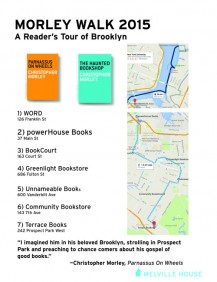June 4, 2015
Remembering Christopher Morley, writer and reader
by Josh Cohen

“We will walk through Brooklyn as Morley’s Roger Mifflin did, with deep appreciation for the place and with joy for the books we encounter along the way.”
Christopher Morley published his first novel, Parnassus on Wheels, about Roger Mifflin and his fanciful travelling bookselling cart, in 1917. Two years later, Morley brought Mifflin back in The Haunted Bookshop, his second book. Then he published 150 more over the next 38 years of his life. When he died in 1957, he left his friends this final message: “Read, every day, something no one else is reading. Think, every day, something no one else is thinking. Do, every day, something no one else would be silly enough to do. It is bad for the mind to continually be part of unanimity.”
Nine years after his death, friends of Morley’s had the Knothole, his Long Island one-room cabin/writing studio, moved to a Nassau County park on Searingtown Road, thereafter renamed Christopher Morley Park. Today, it is home to tennis and basketball courts, a fitness trail, and a dog run. There is a farmer’s market on Wednesdays during the warmer months. There is a pool for swimming in the summer and a rink for ice skating in the winter.
It was on the baseball fields at Christopher Morley where I played Little League. I hit a double down the third-base line, once—the only extra-base hit I can recall from my brief career. Now I write about books.
I lived less than five minutes from Christopher Morley Park for the first 22 years of my life. At no point during my childhood did I learn who Christopher Morley was; I may have been vaguely aware he was a writer, but I did not know of what, and no one else in the community seemed to know, either. I’m aware the Knothole is still there, somewhere. I don’t remember ever seeing it.
When you Google Christopher Morley, Google helpfully assumes you’re looking for Christopher Morley tennis or dog park or ice skating. Morley was once a beloved writer with a truly prolific body of work, featuring a sunny-sardonic voice that remains both accessible and refreshing today. His name remains in plain sight, but it takes some work to find him now.
This could be a moment for Melville House self-congratulations: Parnassus on Wheels and The Haunted Bookshop have found well-deserved homes in our Art of the Novella series, but there are dozens and dozens of Morley titles that are out of print, out of sight and out of mind with slim to no hope of ever returning. Some are truly lost.
Now, as with any writer with a triple-digit number of books to his name, surely not all of them were worth preserving. But that’s a shrug that evades actually scrutinizing Morley’s work due to its large absence.
We’ve catalogued, curated, archived, and saved so much of human history via the Internet that it sometimes feels as though that which is gone was not worth saving. Maybe that’s true some of the time, but acknowledging that and calling it a day ignores how infinitesimal a fraction of civilization we have preserved. Surely there are noteworthy books, noteworthy writers, who have slipped away. Surely there are books and writers on the precipice of obscurity, sitting in some overlooked corner, waiting to be found again.
You want to know why Morley survives while others fade? It’s not just because he’s an enjoyable, engaging writer. The thing is, in Parnassus on Wheels and The Haunted Bookshop, he waxed utopian about both books and New York, two things publishing folks will latch onto in a heartbeat, that they’ll go out of their way to save. Not all writers of his age or earlier were so business savvy. And even with Morley’s humble standing today, he is more celebrated than most.
The Morley Walk is one small way to honor the one preserved author. We will walk through Brooklyn as Morley’s Roger Mifflin did, with deep appreciation for the place and with joy for the books we encounter along the way. The places we will go will share that love of books. Scan the shelves there. Amidst the new releases, old favorites, classics you bring up at dinner parties but secretly have never read, and others, maybe something forgotten will catch your eye. A lovingly worn used copy, or a reprint released without fanfare back into the marketplace. Maybe you pick it up and like it, and tell some friends about it. Maybe that’s the beginning of a little word of mouth. Maybe, if only in your social circle, that keeps a book and an author alive that much longer, if you just keep reading and just keep talking.
In another time, in another place, everyone may have been reading what only you are now. No one else would be silly enough to return that cast-aside book to the public consciousness. And that’s exactly why you should do it.
Click here for more information about The Morley Walk.
Josh Cohen is a contributing editor for MobyLives.